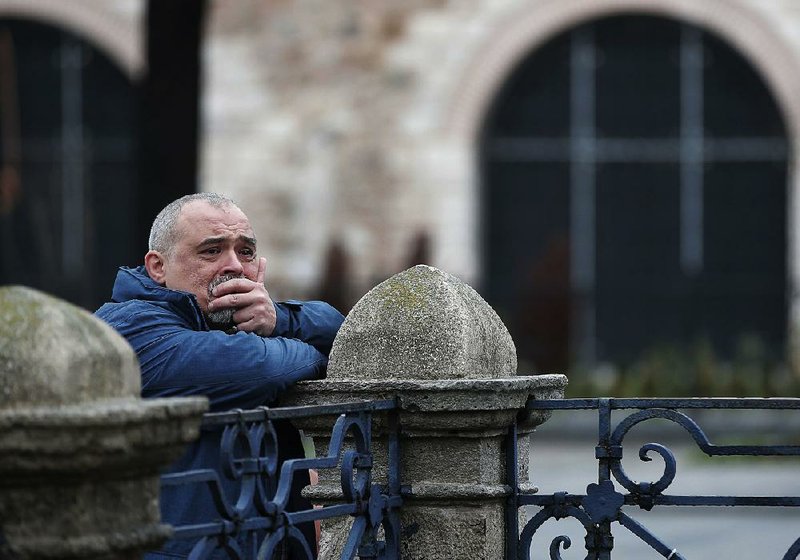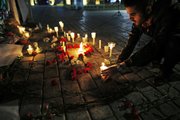ISTANBUL — Turkish police have arrested five people suspected of direct links to the deadly suicide bombing that killed 10 people in Istanbul’s main tourist area, officials said Wednesday.
More than a dozen other suspected Islamic State militants were detained Wednesday in other parts of the country and 59 a day earlier, but officials say they don’t appear to be tied to Tuesday’s attack that occurred near the Blue Mosque in Istanbul’s historic Sultanahmet district.
One suspect with a link to the attack was detained in Istanbul late Tuesday, Interior Minister Efkan Ala said during a news conference with his German counterpart. He didn’t provide further details.
Turkish media outlets said police raided a house in an affluent Istanbul neighborhood, briefly detaining one woman suspected of links to the Islamic State, also known as ISIS, although it wasn’t clear if she was the suspect Ala was referring to. The Hurriyet newspaper said the woman was detained because a mobile phone — which she had reported stolen — had been used to call the bomber. The paper said she was released after questioning.
Hours later, Prime Minister Ahmet Davutoglu announced the arrest of four other people as part of the investigation. He didn’t provide further details about them.
Turkish authorities have identified Tuesday’s bomber as a Syrian man born in 1988 who had recently entered Turkey, and officials say he had links to the Islamic State. The extremist group, however, hasn’t claimed responsibility for the attack.
“This person was not someone who was being monitored,” Davutoglu said. “It is a person who entered normally, as a refugee, as an asylum seeker.”
Davutoglu restated that the bomber was affiliated with the Islamic State, but claimed that other forces may have been behind the attack and were using the extremist group as a “pawn.”
“We are working intensely to find the true actors in the background who are using this terror organization,” Davutoglu said, but didn’t specify what “actors” he was referring to.
Asked whether Turkey could retaliate for the attack with aerial strikes, Davutoglu said: “I say this clearly, we would respond to every attack directed against us with the force we see fit.”
Early today, Turkish media reports said, Kurdish rebels detonated a car bomb at a police station, then attacked it with rocket launchers and firearms, injuring 39 people, including civilians.
The attack targeted the police station in the town of Cinar, in the mostly Kurdish Diyarbakir province, and police lodgings on the top floors of the building, the state-run Anadolu Agency reported. The force of the blast destroyed part of the station’s wall.
Anadolu said at least 13 people were hurt, but the private Dogan news agency put the injury toll at 39.
Another police station also was attacked with rocket launchers in Midyat town, in the province of Mardin, in what appeared to be a simultaneous assault. No casualties were reported there.
Turkish police on Wednesday arrested 13 more suspected militants, including three Russians, but it wasn’t clear whether those arrests were directly linked to the Istanbul bombing.
The attack, which reports now say killed 10 Germans and wounded 15 other tourists
— including Germans, a Norwegian man and a Peruvian woman — was the latest in a string of attacks by Islamic extremists targeting Westerners.
On Wednesday, Davutoglu, German Interior Minister Thomas de Maiziere and other Turkish officials visited the site of the blast and placed carnations there.
Germany sent a team of investigators to Istanbul on Wednesday from its Federal Criminal Police Office, which is comparable to the FBI, to support Turkish authorities investigating the attack.
Germany’s Foreign Ministry said the number of Germans killed in Tuesday’s explosion had risen to 10, but de Maiziere said there was no sign that Germans were specifically targeted.
“According to the investigations so far, there are no indications that the attack was directed specifically against Germans, so there can’t be any connection to our contribution to the fight against international terrorism,” de Maiziere said.
Ala urged Turkish citizens and visitors to go about their daily lives, insisting that the country had taken “all necessary security precautions.” He said Turkey had detained as many as 220 Islamic State suspects in the week before the attack.
De Maiziere said: “I see no reason to refrain from traveling to Turkey” or for people already there to break off their vacations.
Top German and Turkish officials already were scheduled to meet in Berlin next week to discuss Europe’s migrant crisis, in which Turkey
— which borders both Syria and the European Union — is a key player. De Maiziere said those talks now also will address “the determined fight against terrorism.”
“If the terrorists aimed to destroy or endanger the cooperation between partners, then they achieved the opposite,” de Maiziere said. “Germany and Turkey are coming even closer together.”
Turkey’s tourism industry is worth $30 billion and makes up about 12 percent of the country’s gross domestic product, according to the World Travel and Tourism Council, an international travel-industry organization, with the country welcoming about 40 million tourists a year.
The Islamic State and other militant factions have waged similar attacks targeting tourist sites in other countries, including an armed siege of Tunisia’s renowned Bardo Museum in March that claimed more than 20 lives, many European visitors.
Information for this article was contributed by Mehmet Guzel, Suzan Fraser, Geir Moulson and David Rising of The Associated Press and by Loveday Morris and Brian Murphy of The Washington Post.


